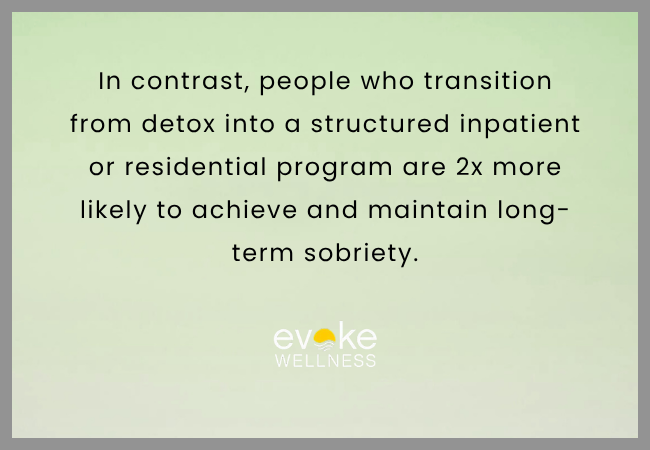Relapse is often misunderstood in the journey of addiction recovery. It’s not simply a failure of willpower or a moral shortcoming—it’s a complex process often influenced by triggers, unresolved mental health issues, and a lack of structured support. That’s why inpatient rehab plays a pivotal role in long-term recovery. It provides the depth of treatment and constant supervision necessary to address the core causes of addiction while offering a safe, substance-free environment.
Addiction is a chronic disease, and like other chronic illnesses, the risk of relapse is always present. Studies show that without structured treatment, relapse rates for substance use disorders can be as high as 40-60%. These statistics underline the importance of comprehensive care, especially during the early and vulnerable stages of recovery. Inpatient rehab, by design, builds the skills, routines, and resilience necessary to withstand the inevitable stressors and triggers of real-world life. This is especially critical after detox, when individuals may feel physically better but are still emotionally raw and mentally vulnerable.
The Early Recovery Period: Why It’s High-Risk
The first weeks following detox or initial abstinence are often when individuals are most likely to relapse. While the body may have started to recover from the physical effects of substance use, the brain’s chemistry remains in flux. Cravings can be overwhelming. Mood swings, anxiety, depression, and insomnia are common. Without a controlled environment and therapeutic support, these symptoms can lead someone right back to using.
This is where inpatient rehab steps in. It provides a buffer between early recovery and full reintegration into daily life. Living onsite removes access to substances, which reduces temptation. More importantly, it creates space for clients to focus entirely on healing.
During this phase, it’s not just about abstinence—it’s about learning how to live again without drugs or alcohol. That includes developing coping skills, working through trauma, and building a community of support. Structured programming also ensures each day is purpose-driven, which helps prevent boredom and isolation—two common relapse triggers.
Psychological and Emotional Support
Many people struggling with substance use disorders also battle co-occurring mental health conditions such as depression, anxiety, PTSD, or bipolar disorder. Without treating these conditions, the likelihood of relapse increases dramatically. A quality Mental Health Treatment Center in Massachusetts can offer the clinical expertise and individualized care required to stabilize both the addiction and the mental health challenges fueling it.
At Evoke Wellness at Cohasset, psychological support is woven into every part of the inpatient experience. From one-on-one therapy sessions to group counseling and evidence-based modalities like Cognitive Behavioral Therapy (CBT) or Dialectical Behavioral Therapy (DBT), the goal is to equip clients with the tools they need to manage emotions, change harmful thought patterns, and cope with stress without turning to substances.
Medical Stability and Ongoing Health Monitoring
For many individuals, the first step before entering inpatient rehab is completing detox. Once stabilized, transitioning directly into a structured rehab environment ensures continuity of care and medical oversight. Some clients may still experience post-acute withdrawal symptoms (PAWS), which can last weeks or months depending on the substance used and the duration of use.
Ongoing medical support is crucial during this time. At facilities offering Medical Detox Programs in Massachusetts, clients receive continued monitoring for physical and psychological symptoms, ensuring that any lingering health concerns are addressed promptly. This constant level of care provides peace of mind and significantly reduces the risk of relapse due to untreated or misunderstood symptoms.
Inpatient rehab also ensures that any medication-assisted treatments (MAT) prescribed during detox are continued safely and correctly, and that clients are educated on the purpose and benefits of those medications. By managing both physical and psychological health comprehensively, inpatient rehab increases the chance of lasting recovery.
Structure and Routine
One of the biggest challenges in recovery is the transition from a life of chaos to a life of structure. Addiction often disrupts every aspect of daily functioning—sleep, nutrition, relationships, work, and self-care. Inpatient rehab provides a highly structured daily routine that helps clients rebuild these foundational elements.
Waking up at a set time, attending therapy sessions, participating in physical wellness activities, eating balanced meals, and engaging in personal development work—all of these create a sense of stability and discipline. Over time, structure becomes habit. When clients re-enter the outside world, they’re better equipped to maintain healthy routines, which is a significant protective factor against relapse.
Even small routines—such as making a bed every morning or attending a group session at the same time each day—help reinforce accountability and give a sense of progress. These habits, while seemingly minor, are often what make the difference between maintaining sobriety or slipping back into old patterns.
Community and Peer Support
Isolation is both a symptom and a driver of addiction. People often turn to substances to escape feelings of loneliness or inadequacy. Conversely, addiction itself often results in broken relationships and social withdrawal. Inpatient rehab addresses this by fostering a community environment where clients live and heal together.
Through peer support, individuals are reminded that they are not alone. They hear others’ stories, share their own, and learn from different perspectives. Group therapy and 12-step participation create a sense of camaraderie and accountability. For many clients, this peer network becomes a critical support system that extends far beyond their time in treatment.
The communal aspect of inpatient rehab also mirrors real-life social interactions, allowing clients to practice communication, boundary-setting, and conflict resolution in a safe and supportive space. These social skills are essential for navigating life after rehab and avoiding the triggers that can lead to relapse.
Individualized Relapse Prevention Planning
Every person’s journey into addiction is different—so is their path to recovery. That’s why personalized relapse prevention planning is a core element of inpatient rehab. These plans are developed through collaboration between clients and their treatment teams and are tailored to identify personal triggers, high-risk situations, and warning signs of relapse.
Clients work through these elements in therapy, developing specific action steps and coping tools they can use in moments of vulnerability. These plans often include post-discharge support options like ongoing therapy, outpatient treatment, support groups, and alumni programs. When executed effectively, a well-thought-out relapse prevention plan gives clients the confidence and resources to stay on track long after they’ve left the rehab environment.
A High Level of Therapeutic Care
The level of care provided in inpatient rehab goes beyond what is typically available in outpatient settings. This includes access to round-the-clock staff, licensed therapists, case managers, and often medical professionals. At a Luxury Rehab Center Massachusetts, clients benefit from a serene, private, and comfortable setting that promotes deep healing and personal transformation.
The environment plays a powerful role in mental health and emotional recovery. Being in a beautiful, distraction-free space allows individuals to focus solely on their healing without the stressors and chaos of their normal surroundings. This atmosphere encourages deeper engagement with therapy and enhances the overall rehab experience.
Why Choose Evoke Wellness?
Evoke Wellness at Cohasset offers a top-tier Intensive Inpatient Program in Massachusetts designed to support clients through every stage of early recovery. Our compassionate, experienced team understands the complexities of addiction and mental health, and we build individualized treatment plans that address each person’s unique needs. From detox to therapy to aftercare planning, we stand by our clients with unwavering commitment.
Conclusion
Inpatient rehab offers more than just a break from substance use—it lays the foundation for long-term recovery by addressing the underlying causes of addiction, teaching coping strategies, providing medical oversight, and fostering connection. Without this comprehensive, immersive support, the risk of relapse remains high.
At Evoke Wellness at Cohasset, we believe in recovery that lasts. Our team is here to walk with you, guide you, and equip you with the tools you need to rebuild your life. If you or a loved one is ready to take the next step, contact us today at 866-931-6429.
Frequently Asked Questions (FAQs)
What is inpatient rehab and how does it help prevent relapse?
Inpatient rehab is a structured, residential treatment program. It helps prevent relapse by providing 24/7 supervision, therapy, and a trigger-free environment.
How long do most inpatient rehab programs last?
Inpatient programs typically last 30 to 90 days, depending on individual needs and substance use history. Longer stays may increase long-term recovery success.
Can inpatient rehab address both addiction and mental health issues?
Yes. Many inpatient programs, like those at Evoke Wellness at Cohasset, offer dual diagnosis care that treats addiction and underlying mental health conditions together.
What support is available after completing inpatient rehab?
After inpatient care, individuals often transition to outpatient programs, therapy, and support groups. Evoke Wellness offers ongoing aftercare planning.
Is inpatient rehab more effective than outpatient rehab?
For individuals at high risk of relapse or with severe addiction, inpatient rehab is generally more effective due to its intensity, structure, and constant support.





